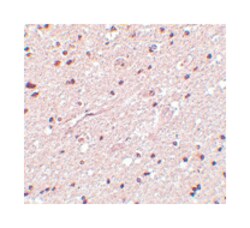Learn More
HAP1 Rabbit anti-Human, Mouse, Rat, Polyclonal Antibody, Abnova™
Rabbit polyclonal antibody raised against synthetic peptide of HAP1.
Supplier: Abnova Corporation PAB12994
Description
Huntington's disease (HD), a neurodegenerative disorder characterized by loss of striatal neurons, is caused by an expansion of a polyglutamine tract in the HD protein huntingtin. This gene encodes a protein that interacts with huntingtin, with two cytoskeletal proteins (dynactin and pericentriolar autoantigen protein 1), and with a hepatocyte growth factor-regulated tyrosine kinase substrate. The interactions with cytoskeletal proteins and a kinase substrate suggest a role for this protein in vesicular trafficking or organelle transport. Several alternatively spliced transcript variants encoding different isoforms have been described for this gene. [provided by RefSeq]
Specifications
| HAP1 | |
| Polyclonal | |
| Rabbit polyclonal antibody raised against synthetic peptide of HAP1. | |
| In PBS (0.02% sodium azide) | |
| HAP2/HIP5/HLP/hHLP1 | |
| Rabbit | |
| 100 μg | |
| Primary | |
| Human, Mouse, Rat | |
| Liquid |
| Immunohistochemistry (PFA fixed), Western Blot | |
| Unconjugated | |
| Western Blot (0.5-1 ug/mL) The optimal working dilution should be determined by the end user. | |
| HAP1 | |
| HAP1 | |
| A synthetic peptide corresponding to internal region 19 amino acids of human HAP1. | |
| RUO | |
| 9001 | |
| Store at 4°C for three months. For long term storage store at -20°C. Aliquot to avoid repeated freezing and thawing. |
Your input is important to us. Please complete this form to provide feedback related to the content on this product.
For Research Use Only

